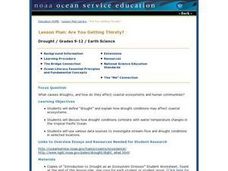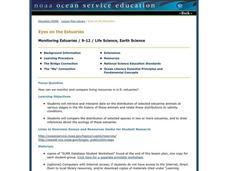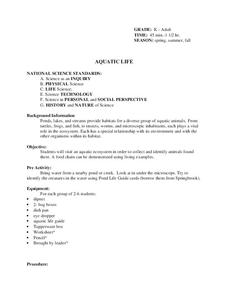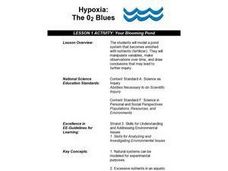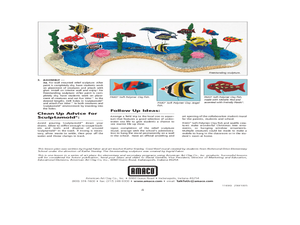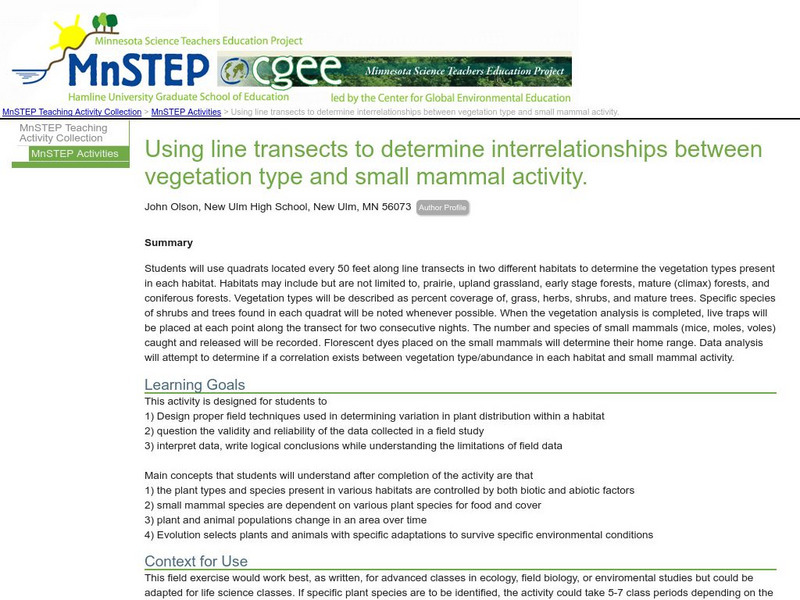Curated OER
Are You Getting Thirsty?
Students study droughts and how they affect communities and coastal ecosystems. In this ecosystems lesson plan students use data to examine drought conditions in certain areas.
Curated OER
Is It Getting Hot In Here?
Students describe several factors and ways climate change could effect communities. In this climate change lesson students research climate change and complete a worksheet.
Curated OER
Eyes on the Estuaries
Students study estuaries and compare several ones in the U.S. In this estuary lesson students interpret data and compare the distribution of different species.
Curated OER
Aquatic Life
Students explore aquatic life. In this science instructional activity, students visit an aquatic ecosystem and collect animals found there. Students create a food chain for the aquatic ecosystem.
Curated OER
Terrestrial Communities
Students watch a video about different terrestrial communities. They conduct an experiment with sponges conserving water. They research desert characteristics comparing them with other biomes.
Curated OER
the Wonder of Wetlands
Students explore the importance of the wetland ecosystem, its properties and functions, as well as, the many birds, animals, and plant life found there.
Curated OER
Erosion Exploration
Ninth graders investigate the factors that increase soil erosion. They identify how the environment is affected by erosion. In small groups, 9th graders research erosion problems in various locations. Groups brainstorm ideas to help...
Curated OER
Where Do Weeds Grow Best?
Student design an experiment in order to determine where weeds grow the best. Through data collection and observations, they discover optimum conditions for weed growth, conditions that make it difficult for weeds to grow, and create...
Curated OER
Leaf Slides
Pupils, in groups, examine leaf slides in order to explore the detail in leaves.
Curated OER
Costa Rican Ecosystems
Learners read about the Cloud Forests in Costa Rica and then answer critical thinking questions about how to prevent loss in this forest and how to slow down global warming.
Curated OER
Birds of Wisconsin
First graders explore the job done by ornithologists. They role play identifying the characteristics that make a bird a bird. They discuss what makes each bird species unique. Students are introduced to Wisconsin's most common and rare...
Curated OER
Gale's Curriculum
Seventh graders develop an understanding of Southeastern Asian culture. They increase knowledge of world geography in relation to Southeast Asian countries. Students research a variety of Southeast Asian animals and habitats to be used...
Curated OER
Growing a Garden
Students research aspects of gardening including nutrition, costs, and soil preparation. They then write a report detailing the planning of the garden and compare costs to buying the items.
Curated OER
Understanding Our Planet's Food Web
Sixth graders, in groups, examine how humans have a tenuous position as part of an ecosystem.
Curated OER
Land Use
Students examine ecosystems that covered Illinois 200 years ago, investigate some living and non-living components of ecosystems, identify components of prairie system, create food webs, and observe human effects on environment. Lessons...
Curated OER
Listening to the Prairie
Students, in groups, visit an exhibit and for a prairie scavenger hunt to locate sunflowers and name products made from them. After sketching a prairie dog, they find nature cues farmers use when growing plants and raising animals. The...
Curated OER
Your Blooming Pond
Students model a pond system that becomes enriched with nutrients (fertilizer). They manipulate variables, make observations over time, and draw conclusions that may lead to further inquiry. They, in groups, simulate a pond environment.
Curated OER
Lichens as Air Quality Indicators: A beginning lichen identification study (2003
Students use GPS and trees to explore lichens and air quality.
Curated OER
Double Consciousness
Pupils explain the concept of double consciousness and evaluate how the concept of double consciousness is reflected in ethnic literature. They read "The Invisible Man" a poem by Langston Hughes and discuss expectations. They analyze...
Curated OER
Who Works in This Forest?
Students examine the variety of jobs that are related to working in the forest. Information on the different jobs is provided in this lesson plan for the teacher to share with the students. The students create a collage using magazines...
Curated OER
Sarita Wetland Restoration
Students collaborate on the plannng and implementation of the Sarita Wetland Restoration. The Sarita Wetland is the remnant of former Lake Sarita that was drained in the early 1900's. The goal of the entire project is to improve water...
Curated OER
Exploring Life in the Coral Reef
Students study life forms in coral reefs. In this ocean life lesson, students study life in coral reefs as they create a coral reef sculpture.
Curated OER
School Forest Lesson- Looking at Literature
Students compare what they learned though literature to the school forest. In this environment lesson, students visit the forest surrounding their school to listen to literature and identify objects in nature. Students create a display...
Science Education Resource Center at Carleton College
Serc: Determining Interrelationships: Vegetation Type and Small Mammal Activity
Students design proper field techniques to determine variation in plant distribution within a habitat, and then interpret data, write logical conclusions, while understanding the limitations of field data.


